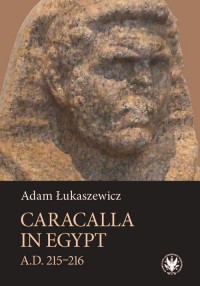
| Dane szczegółowe: | |
| Wydawca: | Wydawnictwa Uniwersytetu Warszawskiego |
| Rok wyd.: | 2022 |
| Oprawa: | twarda |
| Ilość stron: | 286 s. |
| Wymiar: | 170x240 mm |
| EAN: | 9788323555698 |
| ISBN: | 978-83-2355-569-8 |
| Data: | 2022-04-14 |
Opis książki:
Marcus Aurelius Severus Antoninus (188-217) was a young Roman emperor. He lived only 29 years and ruled the Roman empire from 211 to 217. He was the elder son of Lucius Septimius Severus and Julia Domna. The young ruler had been brought up in a milieu interested in philosophy. Caracalla is a nickname, which in ancient sources appears as Karakallos (Caracallus). This word was a name of a coat which the emperor often used. Modern scholarship named the emperor Caracalla to avoid confusion with other Marci Aurelii of Roman history. After a short joint rule with his brother Publius Septimius Geta, Caracalla had him murdered, probably at the end of 211. In 212 the emperor granted Roman citizenship to all inhabitants of the empire. His dream was the conquest of the East and creation of a universal empire. Caracalla was an admirer of Alexander the Great. Like his idol, Caracalla did not avoid the inconveniences of military life, and enjoyed popularity among the soldiers. His hot temper and violent manners led him to acts of cruel tyranny. The present study concerns a mysterious episode of Caracallas war in the East which was a part of his imitation of Alexander the Great. In December 215 the emperor came to Alexandria, a metropolis of Egypt founded by the great Alexander. However, instead of a festive sojourn in Egypt Caracalla sentenced to death the administrators of the province, exterminated the Alexandrian entrepreneurs and in April 216 massacred the inhabitants of Alexandria.
******
Cesarz rzymski Marek Aureliusz Sewer Antoninus (188-217) żył tylko 29 lat, a cesarstwem rządził od 211 r. do 217 r. Był starszym synem Lucjusza Septymiusza Sewera i Julii Domny. Wychowywał się w środowisku zainteresowanym filozofią. Karakalla to przezwisko, które w starożytnych źródłach pojawia się w formie Karakallos (Caracallus) i oznacza płaszcz, którego cesarz często używał. Nowożytna nauka przyjęła ten przydomek, aby uniknąć pomyłek z innymi Markiem Aureliuszem znanym z historii rzymskiej. Po krótkim wspólnym panowaniu z bratem Publiuszem Septymiuszem Getą, Karakalla kazał go zamordować, prawdopodobnie pod koniec 211 r. W 212 r. cesarz nadał obywatelstwo rzymskie wszystkim mieszkańcom państwa. Jego marzeniem był podbój Wschodu i stworzenie światowego imperium. Karakalla był wielbicielem Aleksandra Wielkiego. Podobnie jak jego idol, nie stronił od pełnego niedogodności życia wojskowego i cieszył się popularnością wśród żołnierzy. Jednak gorący temperament i gwałtowne maniery Karakalli doprowadziły go do aktów okrutnej tyranii. Niniejsze opracowanie dotyczy tajemniczego epizodu wojny prowadzonej przez Karakallę na Wschodzie, co wpisywało się w naśladownictwo Aleksandra Wielkiego. W grudniu 215 r. cesarz przybył do Aleksandrii, egipskiej metropolii założonej przez Aleksandra. Jednak zamiast świętować pobyt w Egipcie, Karakalla skazał na śmierć zarządców prowincji i przedstawicieli lokalnego rzemiosła, a w kwietniu 216 r. dokonał masakry mieszkańców miasta.
Książka "Caracalla in Egypt (A.D. 215-216)" - Adam Łukaszewicz - oprawa twarda - Wydawnictwo Wydawnictwa Uniwersytetu Warszawskiego. Książka posiada 286 stron i została wydana w 2022 r.

